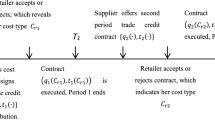Abstract
In long-term recurring contractual relationships, which are common in the B2B-arena, reputation and trust play a crucial role. This analysis investigates the joint impact of reputation and price-based ranking of suppliers on the material flow in the supply chain. Positive reputation proves to be a key factor in reaching dominating market positions, which illustrates the importance of building brand awareness in all stages of a supply chain. Through our simulation, it will be observed that the ranking of suppliers by reputation-based choice has a stabilizing effect on the material flow in the supply chain. A strong reputation component in the individual choice stimulates the formation of monopolies, while the discount of reputation imposes a countertendency on this effect. The Bullwhip Effect, another phenomenon that carries a countertendency to the reputation-based monopoly effect, is observed to be even stronger for members of tiers with a high fluctuation of order rates.










Similar content being viewed by others
Notes
For the purpose of our model, two more agents have been created, one acting as the first supplier and always delivering raw material, and the other acting as the consumer provided with an exogenous demand level
If the estimated stock in the requested delivery period is insufficient to fulfill the order request and the suppliers are unable to deliver on time, the order request will be rejected
In this figure, the factory shows the highest standard deviation, while the retailer shows the smallest standard deviation. Distributors and raw material suppliers are in between these two. The data row marked “Exogenous” depicts the standard deviation of the exogenous orders generated by the consumer
We conducted 50 simulation runs with 5,000 simulated periods each for weightings of reputation toward price between 0.0 and 1.0
The price-to-reputation weighting is set to 0.5
For each setting, we performed 50 simulation runs with 5,000 simulated periods
References
Carter J, Bitting E, Ghorbani A (2002) Reputation formalization for an information-sharing multi-agent system. Computational Intelligence 18(4):515–534
Eymann T, Padovan B, Pippow I, Sackmann S (2001) A prototype for an agent-based secure electronic marketplace including reputation tracking mechanisms. In: Proceedings of the 34th Hawaiian international conference on systems sciences, Hawaii
Fox M, Chionglo J, Barbuceanu M (1993) The integrated supply chain management. Technical report, Department of Industrial Engineering, University of Toronto
Hall R (1978) Stochastic implications of the life cycle-permanent income hypothesis: theory and evidence. The J Political Economy 86(6):971–987
Kalakota R, Stallaert J, Whinston A (1996) Implementing real-time supply chain optimization systems. Technical report, Department of MSIS, University of Texas at Austin
Kreps D, Wilson R (1982) Reputation and imperfect information. J Economic Theory 27:253–279
Kumar K (2001) Technology for Supporting Supply Chain Management. Communications of the ACM 44(6):58–61
Lambert D, Cooper M, Pagh J (1998) Supply Chain Management: Implementation Issues and Research Opportunities. The Int J Logistics Manage 9(2):1–19
Lee H, Padmanabhan V, Whang S (1997) Information distortion in a supply chain: the Bullwhip Effect. Manage Sci 43(4):546–558
Mahajan S, Ryzin G (1999) Supply chain coordination under horizontal competition. Working paper, Columbia University/Duke University
Marsh S (1992) Trust and reliance in multi-agent-systems. A preliminary report. Department of Computer Science and Mathematics, University of Stirling
Mui L, Mohtashemi M, Halberstadt A (2002a) A computational model of trust and reputation. In: Proceedings of the 35th Hawaii international conference on systems sciences, Hawaii
Mui L, Mohtashemi M, Halberstadt A (2002b) Notions of reputation in multi-agent systems: a review. In: Proceedings of the AAMAS’02, Bologna, Italy
Sabater J, Sierra C (2001) REGRET: A reputation model for gregarious societies. In: 4th workshop on deception fraud and trust in agent societies, Montreal, pp 61–70
Sabater J, Sierra C (2002) Reputation and social network analysis in multi-agent systems. In: Proceedings of the first international joint conference on autonomous agents and multiagent systems: part 1, ACM Press, New York
Shen W, Norrie DH (1998) An agent-based approach for manufacturing enterprise integration and supply chain management. In: Proceedings of the 3rd international conference on the practical applications of agents and multi-agent systems (PAAM-98)
Swaminathan J, Smith S, Sadeh N (1998) Modeling supply chain dynamics: a multiagent approach. Decis Sci 29(3):607–632
Tesfatsion L (2000) Introduction to the CE special issue on agent-based computational economics. Department of Economics, Iowa State University
Wooldridge M (2000) In: Weiss G (ed) Intelligent agents multiagent systems—a modern approach to distributed artificial intelligence. MIT, Cambridge, pp 27–77
Author information
Authors and Affiliations
Corresponding author
Rights and permissions
About this article
Cite this article
Franke, J., Stockheim, T. & König, W. The impact of reputation on supply chains. An analysis of permanent and discounted reputation. ISeB 3, 323–341 (2005). https://doi.org/10.1007/s10257-005-0007-4
Published:
Issue Date:
DOI: https://doi.org/10.1007/s10257-005-0007-4




